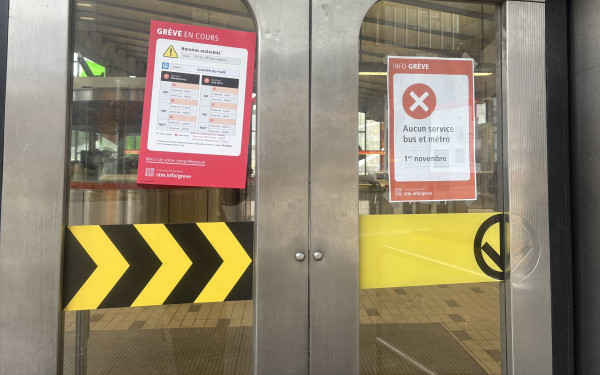Strike Zone
Concordia students have seen a first strike.
It was made official, in part, by the Arts and Science Federation of Associations’ vote for a one-day strike on Nov. 10.
Now that the Day of Action has passed, it’s possible the university will see a strike two and three. There’s no indication when we’ll be out, though.
What is clear is that if the provincial government doesn’t change its stance on the planned $325 per year tuition hike, a strike of some sort will definitely be discussed at Concordia.
“For us, the question is, are we talking a one-day strike? A three-day strike? An unlimited general strike?” asked Concordia Student Union President Lex Gill. “These are the questions where we won’t really know how students are feeling until January or February.”
During the Day of Action, ASFA had been the only faculty association to vote for a one-day strike.
CSU VP External Chad Walcott said he would like to discuss with all the faculty associations the possibility of each voting for their own general strike, rather than having the CSU acting on behalf of all undergraduate students at the school.
This would include opening a dialogue with the Engineering and Computer Science Association, which has maintained a neutral stance on the issue.
“I’d like for each faculty association to call their own strike and then that would be kind of striking by general strike as well,” said Walcott. “In the event that the ECA is not interested in taking any stance, if we have at least three faculty association on board, it will be clearly representative of the student body, in that case.”
Individual strike mandates by the faculty associations would require more mobilization of students than a general CSU mandate.
ASFA required a quorum of 371 students to participate in their strike vote for it to be binding. Under proposed new bylaws that students will vote on in a byelection at the end of November, quorum for a CSU referendum to be binding will be dropped to 450 students. Currently, quorum consists of 2.5 per cent of the over 35,000 undergraduate students at Concordia, or roughly 875 individuals.
Should Concordia vote to strike, it won’t be alone. Gill promised that striking is only an option if other universities feel the same way.
“One school going on strike isn’t effective. The only reason you go on strike is because everyone else is. That’s why normally when you get a strike mandate, you have a motion that’s worded something like, ‘We will strike as soon as 150,000 other people have strike mandates.’”
Walcott noted that a strike vote, either at the CSU or faculty association level, is not a sure thing. On the November ballot, there will be a question asking students how they feel about tuition increases, the results of which will play a role in determining how the CSU will proceed.
“In the winter semester, depending on how the referendum goes, how the talks with the faculty associations go, we’ll have a better understanding of what lies ahead. If people are in favour of going on strike again, we’ll discuss that. If not, we’ll discuss other options we can take to keep up the pressure.”
What those other tactics might be is still up in the air. Walcott said that there are no major demonstration plans for the rest of the semester, but that this would change as early as the beginning of the winter term.
Gill said that efforts would still be underway to educate students on the tuition issue.
“Classroom speeches won’t stop. A lot of the things we were doing leading up to the [Nov. 10] demo aren’t going to stop. Keeping a presence in the mezzanine, talking to classes, looking for more public support.
“We’re looking at a number of education campaigns, public panels, things like that,” she continued. “Possibly some action around January, during tuition-paying season.”
When asked to elaborate, Gill remained coy. “I’m not tipping off the university this early in the the game. I’ve got two months.”

3_900_600_90.jpg)




0_600_375_90_s_c1.jpg)